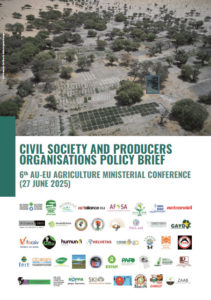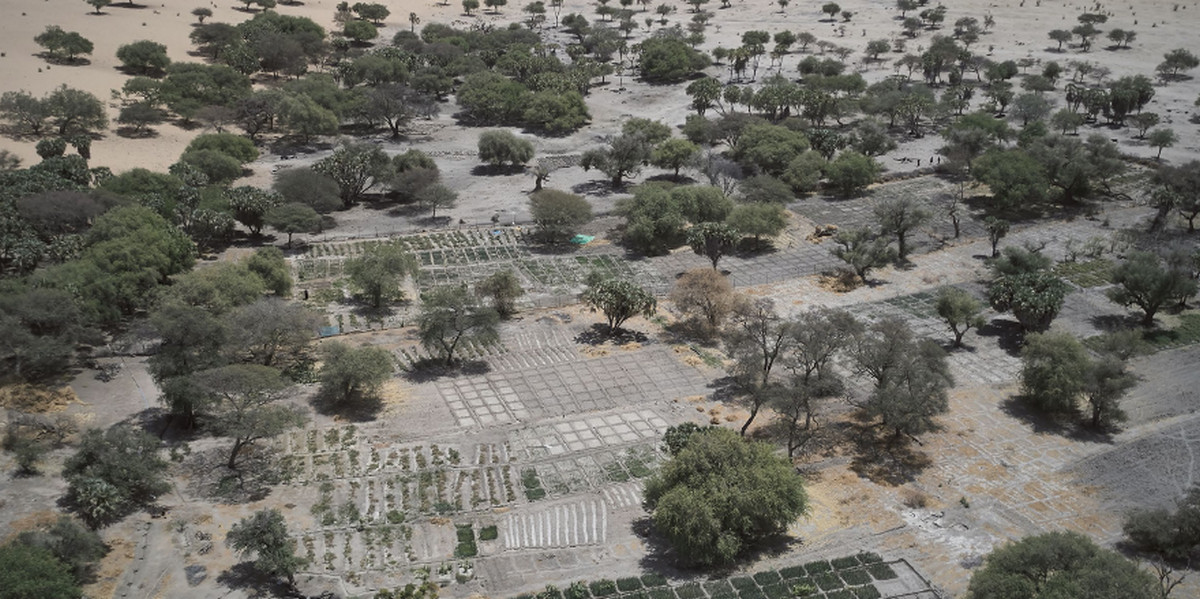Civil Society and Producers Organisations Policy Brief & Recommendations, June 2025
At a time when multilateralism, human rights and international solidarity are under strain, the sixth African Union (AU) – European Union (EU) Agriculture Ministerial Conference (Rome, 27 June 2025) must signal a renewed and ambitious commitment to transforming food systems in support of food sovereignty, the right to food, and long-term sustainability.

CIDSE has joined over 40 African and European civil society and producer organisations in calling for the following recommendations to be integrated into the outcomes of the Ministerial Conference, building on the conference’s four priority areas:
1. Investment and Financing in Agri-food Value Chains
2. Sustainable Practices and Climate Resilience
3. Research, Innovation, and Technology
4. Market Access and Trade Facilitation
These recommendations are formulated to address the unacceptable reality of nearly 300 million people — one in five — across the African continent facing hunger, with undernutrition, child stunting, wasting, and anemia still falling short of international targets.
Key Themes & Recommendations
- Make Food and Agriculture Central to the AU-EU Partnership
– Elevate agriculture in the AU-EU agenda.
– Align climate, trade, and development policies with inclusive food systems. - Support Democratic, Coherent, and Human Rights-Based Food Policies
– Ensure policies are led by producers and uphold human rights.
– Align with international instruments like UNDROP, UNDRIP, CEDAW.
– Require human rights and environmental impact assessments. - Redirect Finance toward Agroecology
– End public support for fossil-intensive industrial agriculture.
– Allocate at least 30% of agricultural funding to agroecology.
– Cancel unsustainable debt; direct climate finance to communities. - Protect and Promote Farmer-Managed Seed Systems
– Legally recognise these systems, reject GMOs and UPOV-style IP regimes.
– Support seed sovereignty through local investment. - Support Fair and Inclusive International Trade to Support Food Sovereignty
– Reduce food import dependency; protect local markets.
– Reevaluate trade deals and the Global Gateway to benefit communities. - Eliminate Toxic Agrochemicals and Ensure Safe Work Conditions for Farmers and Workers
– Ban EU export of banned pesticides.
– Phase out chemical fertilisers; promote agroecological soil practices.
– Ensure safe, fair working conditions. - Stop Land and Ocean Grabbing
– Ban large-scale land deals; enforce free, prior, informed consent (FPIC).
– Protect customary tenure; provide restitution for displaced communities.
– Reject false solutions like carbon offsetting. - Strengthen Family Farming & Territorial Food Systems
– Invest in local markets and agroecological procurement.
– Shield from harmful imports and supermarket dominance.
– Deliver on the UN Decade of Family Farming. - Promote Gender Equality & Youth Inclusion
– Require gender-equity analysis of investments.
– Guarantee access to land, finance, leadership for women and youth. - Address Root Causes of Conflict and Forced Displacement
– Stop using development funds for migration control.
– Invest in rural livelihoods and community-based food systems.
– Focus peacebuilding on food and land rights, not extraction.
These recommendations will be presented at an official side event during the AU-EU Ministerial Conference on 27 June from 12:00-14:00.
The statement remains open for organisational endorsements until September 2025 – we invite you to sign on.
CIDSE contact: Manny Yap, Food and Land Officer (yap(at)cidse.org)
Cover photo credit: Christophe Da Silva ACF

